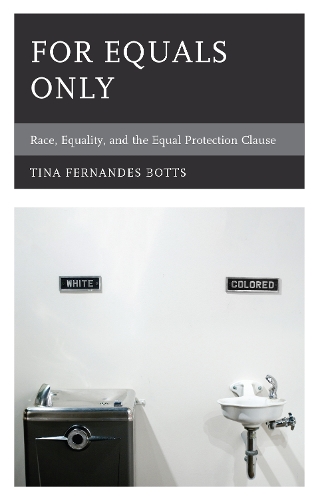
For Equals Only: Race, Equality, and the Equal Protection Clause
(Hardback)
Available Formats
Publishing Details
For Equals Only: Race, Equality, and the Equal Protection Clause
By (Author) Tina Fernandes Botts
Bloomsbury Publishing PLC
Lexington Books
15th September 2018
United States
Classifications
Professional and Scholarly
Non Fiction
Ethnic groups and multicultural studies
Ethnic studies / Ethnicity
Social and cultural history
342.73085
Physical Properties
Hardback
142
Width 159mm, Height 238mm, Spine 19mm
399g
Description
This book philosophically explores how changing conceptions of race and equality have affected Supreme Court interpretations of the Equal Protection Clause of the 14th Amendment to the U.S. Constitution over the years. In the years since the 14th Amendment was ratified in 1868, in its decisions interpreting the Equal Protection Clause, the Supreme Court has switched from using a sociocultural concept of race to using a biological concept of race, and during the same time period has switched from using a social to a legal concept of equality. One result of these trends is the recent emergence of something called 'reverse discrimination.' Another result is that the Equal Protection Clause no longer specially protects racialized persons from racial discrimination, as it was originally intended to do. Using the tools of legal hermeneutics, critical philosophy of race, and critical race theory, key cases of racial discrimination in equal protection law are examined through a historical lens. The Supreme Courts switch, over the years, from interpreting the Equal Protection Clause as specially protecting racialized persons from continued racial discrimination after the end of the institution of chattel slavery, to interpreting the Clause as protecting everyone from racial discrimination, is tracked alongside changing conceptions of race and equality. As the concept of race became biological, the concept of equality became legal, and the result was the elimination of remedying the negative effects of chattel slavery on the equality status of racialized persons from the Supreme Courts list of priorities.
Reviews
Racial injustice represents more than lapses in legal compliance but rather a system of marginalization rooted in our history and social habits. In For Equals Only: Race, Equality, and the Equal Protection Clause, Tina Botts sharply analyzes the equal protection clause in the fourteenth amendment in light of our history of racial marginalization to argue that our reliance on it needs to shift towards responding to inequalities as social and historical rather than as simply legal. In doing so, Botts urges us to think about the equal protection clause as intended for addressing disparities in social status and standing rather than as a tool for individual cases of discrimination. For Equals Only arrives at a moment of reinvigorated debates around the role of the state in perpetuating racial injustice and helps clearly articulate what we most need to know about our collective duties to black citizens. -- Christopher Lebron, Johns Hopkins University
Liberalism as a political philosophy rests foundationally on the idea of the moral, legal, and political equality of persons. But what happens when race and white supremacy make some persons in effect more equal than others In this fascinating and illuminating investigation, Tina Botts demonstrates how the 14th Amendments Equal Protection Clause has come to be interpreted in such a way as to enshrine rather than challenge the ongoing social inequality of those lesser persons racialized as black in the United States. -- Charles W. Mills, CUNY Graduate Center
Tina Botts methodically shows how the concepts of biological race and legal equality in use by the US Supreme Court leave out present and past experiences of discrimination against nonwhite people in society. This call for a more comprehensive interpretation of the Equal Protection Clause of the 14th Amendment should spur change and spark reflection among legal scholars, political philosophers, and researchers of race in the United States. -- Naomi Zack, Professor of Philosophy, University of Oregon
Author Bio
Tina Fernandes Botts is assistant professor of philosophy at California State University, Fresno.
